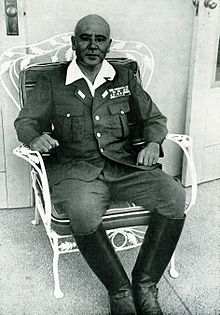Masaharu Homma
| Masaharu Homma | |
|---|---|
| 本間 雅晴 | |
 |
|
| Japanese Military Governors of the Philippines | |
|
In office January 3, 1942 – June 8, 1942 |
|
| Preceded by | Newly established |
| Succeeded by | Shizuichi Tanaka |
| Japanese Military Administrator Japanese Military Commander of the Philippines |
|
|
In office January 3, 1942 – January 23, 1942 |
|
| Preceded by | Newly established |
| Succeeded by | Jorge B. Vargas |
| Personal details | |
| Born |
November 27, 1888 Sado, Niigata, Japan |
| Died | April 3, 1946 (aged 58) Los Baños, Laguna, Philippines |
| Religion | Shinto |
| Military service | |
| Nickname(s) | "The Poet General" |
| Allegiance |
|
| Service/branch |
|
| Years of service | 1907–1943 |
| Rank | Lieutenant General |
| Commands |
27th Infantry Division Taiwan Army of Japan 14th Army |
Masaharu Homma (本間 雅晴 Homma Masaharu?, November 27, 1887 – April 3, 1946) was a lieutenant general in the Imperial Japanese Army during World War II. Homma commanded the Japanese 14th Army which invaded the Philippines and perpetrated the Bataan Death March. After the war, Homma was convicted of war crimes relating to the actions of troops under his direct command and executed by firing squad on April 3, 1946.
Homma was born on Sado Island, in the Sea of Japan off Niigata Prefecture. He graduated in the 14th class of the Imperial Japanese Army Academy in 1907, and in the 27th class of the Army Staff College in 1915.
Homma had a deep respect for, and some understanding of, the West, having spent eight years as a military attaché in the United Kingdom. In 1917 he was attached to the East Lancashire Regiment, and in 1918 served with the British Expeditionary Force in France, being awarded the Military Cross.
From 1930 to 1932, Homma was again sent as a military attaché to the United Kingdom, where his proficiency in the English language was useful. He was also assigned to be part of the Japanese delegation to the Geneva Disarmament Conference in 1932 and served with the Press Section of the Army Ministry from 1932 to 1933. He was given a field command again, as commander of the IJA 1st Infantry Regiment from 1933 to 1935, and was promoted to command the IJA 32nd Infantry Brigade from 1935 to 1936.
...
Wikipedia
